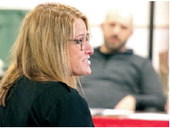Legislators talk state aid with area schools
By Mandee Ellis The Star-News
Wisconsin senators and representatives gathered at Medford Area Senior High on Monday to meet with area school leaders and discuss funding challenges that rural Wisconsin districts are facing.
Among the politicians were Sen. Jesse James of Senate District 23, Rep. Rob Summerfield of Assembly District 68, Rep. Karen Hurd of Assembly District 69, Rep. John Spiros of Assembly District 86, Rep. Patrick Snyder of Assembly District 85, and Sen. Romaine Robert Quinn of Senate District 25.
Attendees in the audience included school board members and administrators from districts in Edgar, Athens, Neillsville, Greenwood, Gilman, Stratford, Abbotsford, Colby, Medford, Owen-Withee, Rib Lake, Spencer, Mosinee, Marshfield, Chequamegon, and the Cooperative Educational Service Agency 10 (CESA 10). Officials tasked with presenting included Rib Lake District Administrator Travis Grubbs, Gilman School District Administrator Walter Leipart, Medford Business Services Director Audra Brooks, Neillsville District Administrator John Gaier, Colby District Administrator Patrick Galligan, Medford Elementary Principal Dan Miller and Medford District Administrator Laura Lundy.
One of the largest issues is that schools are
See FORUM/ page 3 Forum
Continued from page 1
no longer granted inflationary increases, which they had been receiving up until 2009.
“Districts are lagging more than $3,300 (per student),” Brooks stated, noting that the difference equates to roughly $6.9 million that Medford schools alone are denied due lack of inflationary funds.
Lundy reported that over 60% of districts are experiencing declining enrollment, which forces districts to rely on operational referendums.
“Nobody wants to go to referendum,” Brooks said. “They chip away at the trust of our community, but we have no choice,” Lundy said.
“The funding formula really has been disadvantaged to districts that have declining enrollment and increased property values,” Leipart said.
Lundy said the state has restricted referendums to regular election dates and limited them to two questions per calendar year, with some at the state level stating that there may be limits on length and type heading their way as well.
“In addition to the lack of inflationary increase, we’re asked to do more with less,” Lundy said. “One of the big ones is special ed.”
Brooks discussed differences between expenses that are categorized as sum sufficient, which occurs when the state allocates enough money to cover the actual costs of a program, and sum certain, or fixed sums that are divided among eligible districts. Special education support is funded as a fixed sum that is divided among eligible districts, while private school vouchers are covered as an actual cost. Brooks reported that special education needs have gone up 51% in 10 years while vouchers have increased 172%.
“We may run into situations like Florida and Arizona,” said Brooks of other locations that are struggling with enrollment declines and funding shortfalls. “They’re funding two education systems.”
With regard to adequacy in special education, Brooks reported that districts are currently only receiving roughly 30% in aid for their special education costs.
The panel asked the legislators to keep revenue limits inflationary and to improve the funding for special education, which would in turn help all students as money would no longer need to be pulled from general funds (Fund 10) to support students who rely on special education services.
In the 2023-2024 school year, Medford schools transferred $4.9 million from the general fund to pay for special education expenses while Rib Lake transferred $680,330, Colby transferred $1.2 million, Neillsville transferred $1.1 million and Gilman transferred $550,000.
“These students often require additional services, things like speech therapy, specialized instruction, one-on-one support and adaptive technologies. These are not extras, they are essentials,” Lundy said.
Gaier reported that there is a relationship between students with special education needs and those who live in areas that experience higher poverty rates, making the funds schools are reimbursed even more necessary.
In addition, when districts pull from Fund 10 to support special education students, they lack money for updated curriculum, enrichment programs, technology upgrades, and teacher development.
“The first 100 kids that walk in our door, regular education kids, we do not get money for,” Gaier said.
“We are asking you to fight to increase the state’s portion of special education costs and make them sum-sufficient so we can lessen the strain on our already strained budgets,” Lundy said to the representatives.
Miller brought up an additional insufficiency within unfunded Act 20 (a state law that focuses on early literacy), which requires schools to purchase materials that used to be free. He reported that some of their curriculum suppliers appear to be price gouging schools.
“We spent $40,000 on just the pilot materials, which three of those curriculums we aren’t even going to use,” Miller stated. “Maybe we could cap that amount.”
Under Act 20, Miller reported that schools are required to provide extra training for their teachers as well, even for those who have already received the same or similar training. As with curriculum pilot materials, some of those training opportunities used to be free but now come with a hefty price tag.
“I can’t imagine having to do my entire staff,” said Grubbs of the training that Act 20 mandates for teachers.
Wisconsin schools were told they were going to get $50 million to cover Act 20 implementations, but those funds have been partially vetoed by Gov. Evers in an attempt to reallocate those funds and remove provisions for private voucher and charter schools, which resulted in a lawsuit against Evers filed by Republican lawmakers.
“I know that that money is going to expire by the end of June,” Brooks said.
“The reason money is not released is because the governor partially vetoed the bill,” Summerfield said. “The governor decided to play games and vetoed it. Everyone at this table voted for that,” he said of the need to get that money to the districts.
“There’s a good chance the budget is going to be late, which is not good for anybody. No one is not trying to do a budget,” Quinn said.
Ultimately, the panel of school advocates asked the representatives and senators to provide inflationary increases at $12,650 per student, fund special education at 60%, and provide districts with targeted aid.
“This isn’t your fault, but we do depend on you to be our fighters to get it fixed,” Gaier said. “When you’re asking a district with high poverty to pass a referendum to operate, it’s a much bigger issue,” he continued, stating that the tax impact in Neillsville is likely higher than in places like Verona. “My kids will always be valued at least $1,000 less than voucher high schools.”
Gaier continued, stating that property values in Neillsville have gone up 22%, leading to a loss in general aid as districts start appearing wealthier than they actually are.
“We’re also subject to inflation at the state level too,” Hurd said. “It is the worst that it’s ever been.' She compared the school’s budget to a family budget.
“What's most important to you?' Hurd asked the panel of school representatives. She asked if the schools wanted either inflationary increases or special education funding, or “a little bit of both.”
“What are the priorities, what does the future look like?” asked Summerfield.
“Your responsibility is the general aid,” Gaier replied. “Fight for us in caucus and do the best you can.” He also stated that the state should make sure that general aid goes to the districts that need it the most.
“We're not asking for money back, we’re just asking, from here on, it’s exactly the same thing you did last time,” Gaier continued, noting that the state should be working to get 90% of the school districts in the state within 10% of each other.
“Obviously referendums aren’t fun. It does give your voters an opportunity to weigh in. You’re asking the legislature to do the same thing,” Quinn said. “Whatever we promise you today, we have to be able to fund tomorrow.”



